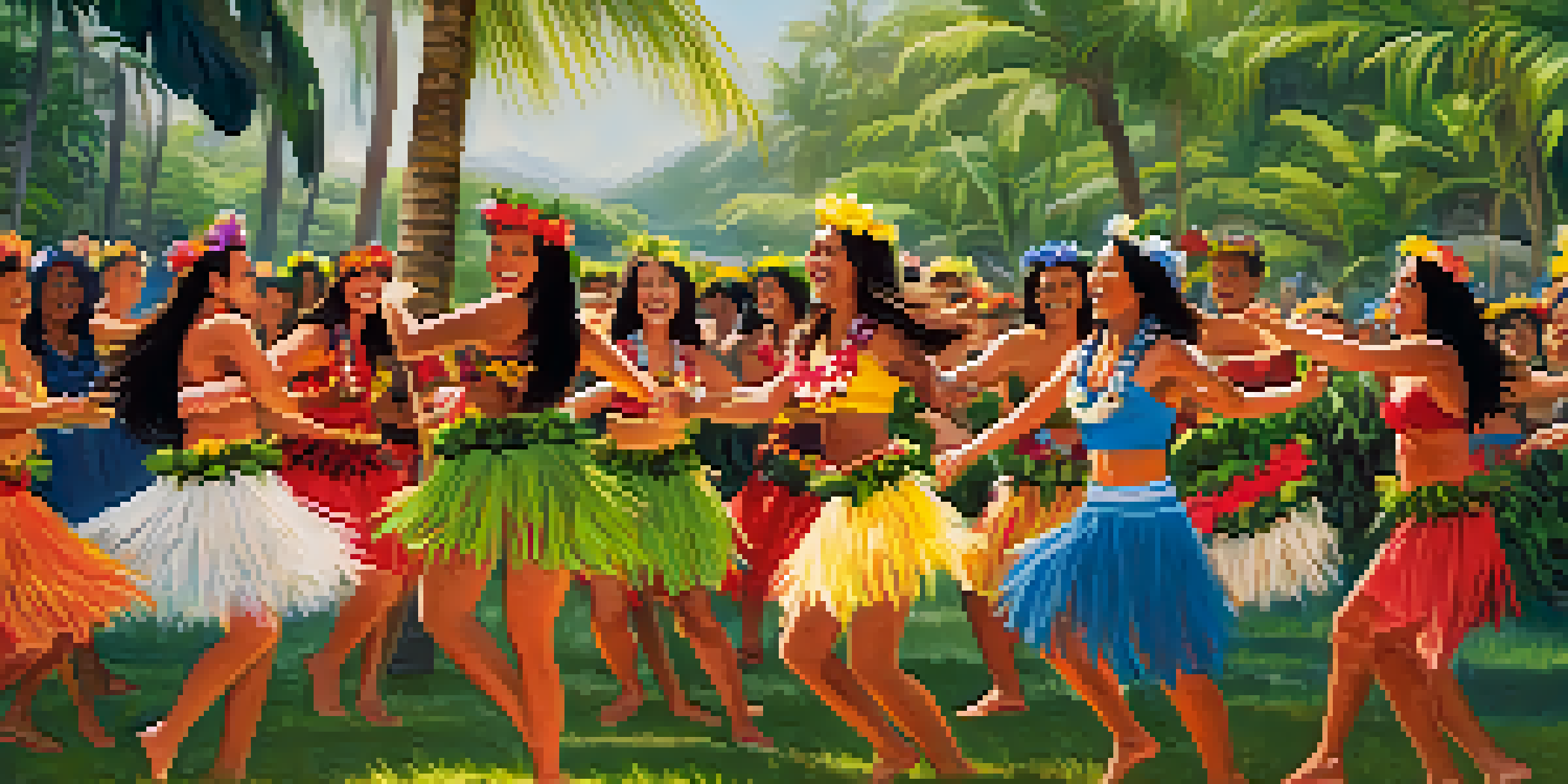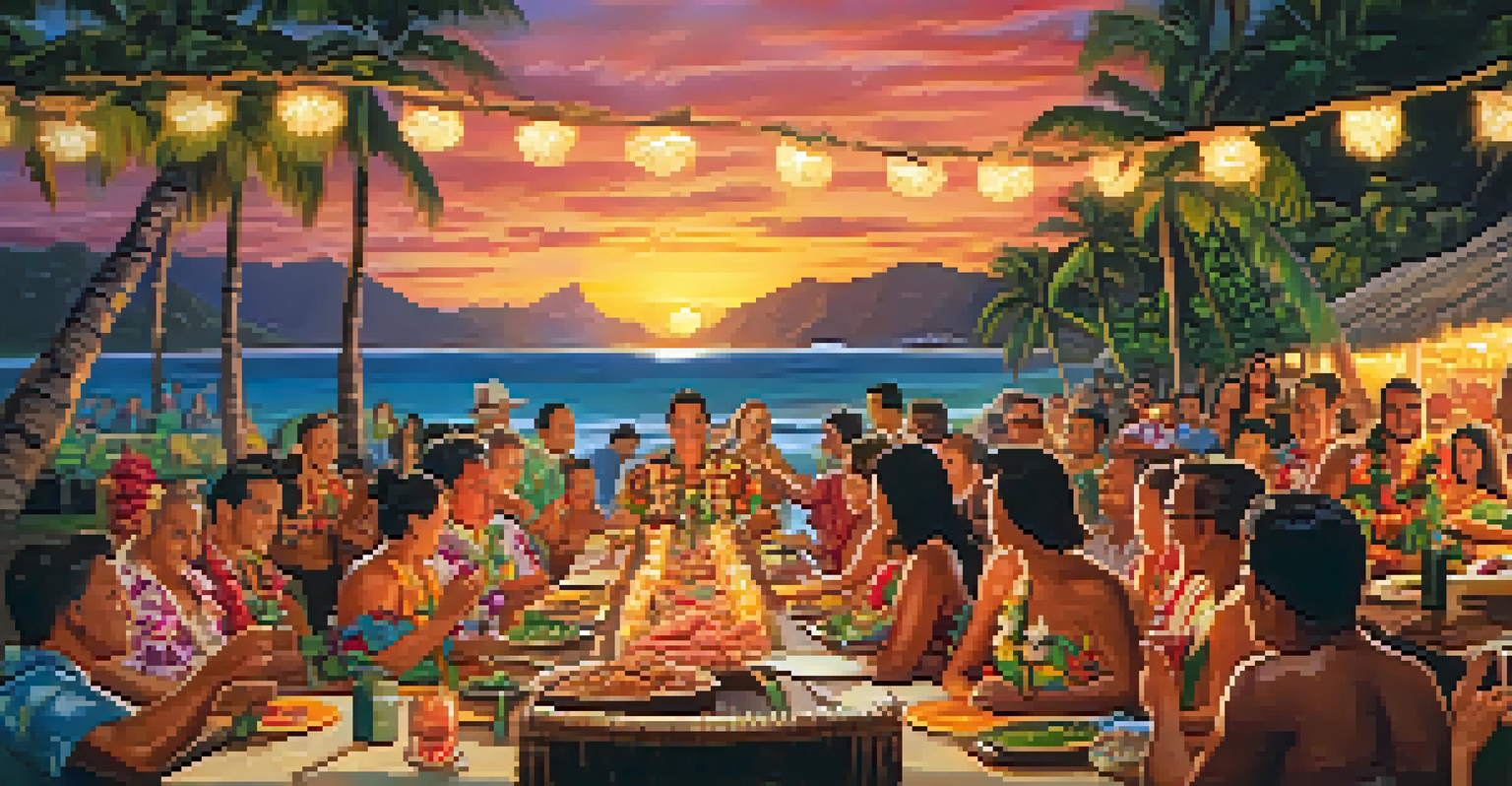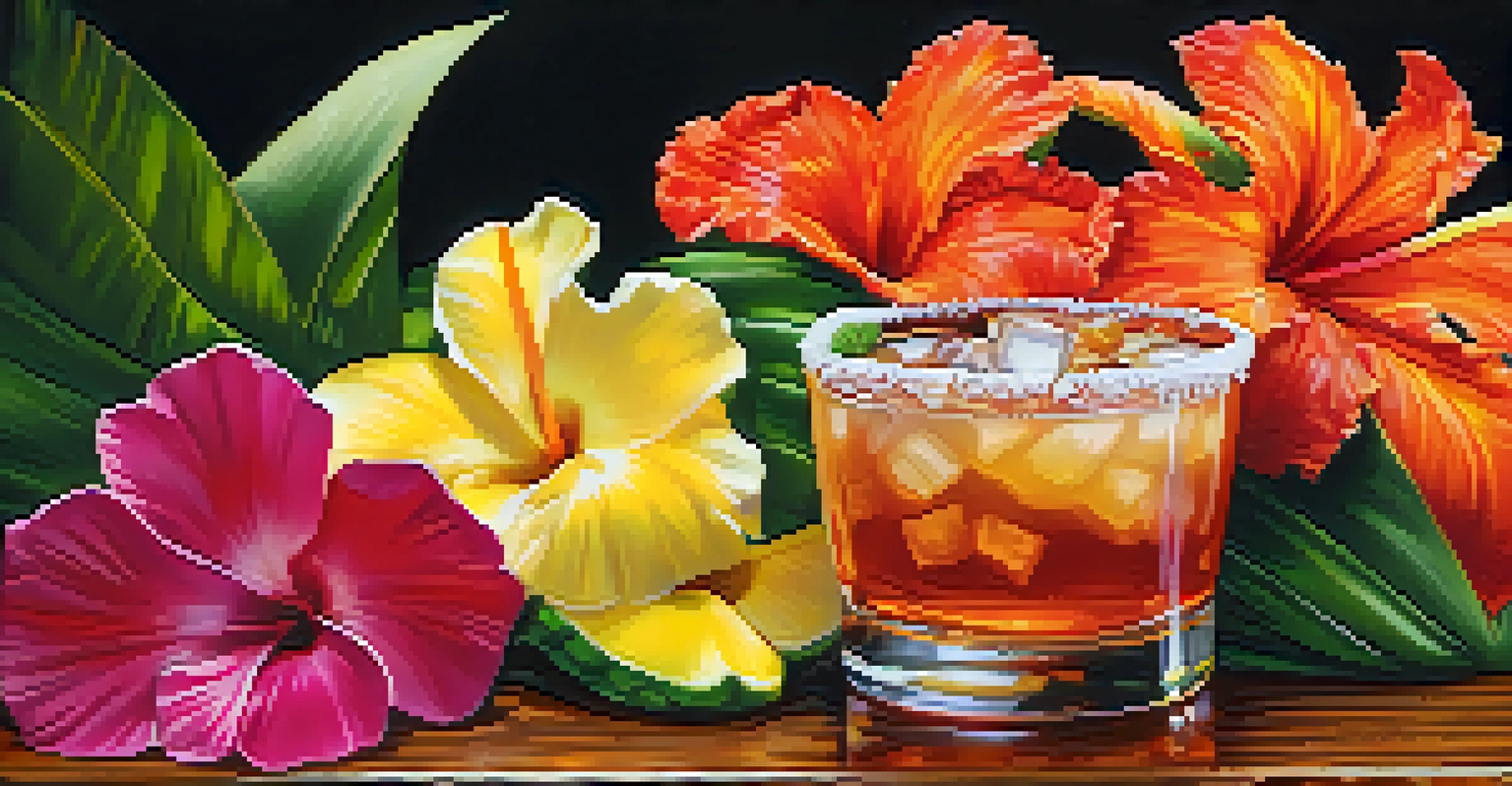Luaus: Celebrating Hawaiian Culture Through Food and Festivities

The Origins of Luaus: A Cultural Celebration
Luaus have deep roots in Hawaiian culture, dating back to ancient times when they were held to honor royalty. Originally, these feasts were exclusive gatherings for high-ranking chiefs and their families, symbolizing status and connection to the land. Over time, luaus transformed into inclusive celebrations of community and culture, inviting everyone to partake in the festivities.
A luau is not just a feast; it is a celebration of life, a gathering of friends and family, and an expression of love and gratitude.
The word 'luau' itself refers to a traditional Hawaiian feast, often featuring a variety of local dishes. These gatherings are not just about food; they embody the spirit of 'aloha'—love, peace, and compassion. By participating in a luau, attendees engage in a rich tapestry of history, music, and dance that showcases Hawaiian heritage.
Today, luaus are popular tourist attractions, but they retain a sense of authenticity, celebrating the traditions and stories that have been passed down through generations. Whether it's a backyard gathering or a larger event, the essence of luaus remains rooted in the celebration of community and the sharing of culture.
Traditional Luau Foods: A Culinary Journey
One of the most delightful aspects of a luau is the food, which is a feast for the senses. Traditional dishes often include kalua pig, which is slow-cooked in an underground oven called an imu, resulting in tender, smoky meat. Other staples include poi, a taro-based dish, and lomi-lomi salmon, a refreshing salad made with diced tomatoes and onions.

The preparation of these dishes is a labor of love, often involving family and friends who come together to cook and celebrate. Each dish has a story, connecting the past to the present, as recipes have been passed down through generations. The communal aspect of sharing a meal emphasizes the importance of togetherness in Hawaiian culture.
Luaus Celebrate Hawaiian Culture
Luaus are vibrant gatherings that honor Hawaiian traditions through food, music, and dance, inviting everyone to share in the spirit of aloha.
Beyond the savory dishes, luaus also feature tropical fruits, sweet desserts like haupia (coconut pudding), and refreshing beverages such as mai tais. This vibrant array of flavors not only satisfies the palate but also reflects the natural bounty of the islands, showcasing the connection between the land and the people.
The Role of Music and Dance in Luau Celebrations
Music and dance are integral to luaus, providing an entertaining backdrop that brings the festivities to life. Traditional Hawaiian music, often played on ukuleles and guitars, sets a joyful tone that invites participation. Hula dancing, with its graceful movements and storytelling, is a key feature of luaus, expressing the rich narratives of Hawaiian culture.
In Hawaii, the spirit of aloha is at the heart of every gathering, reminding us to share joy, kindness, and respect.
Hula is not just a dance; it is a form of communication, conveying stories of nature, love, and history through movement. Each gesture and expression holds meaning, allowing performers to connect with their audience on a deeper level. This interactive experience makes luaus not just a visual spectacle but also an emotional journey.
As guests are encouraged to join in, the atmosphere becomes inclusive and celebratory. Whether it's learning a few hula steps or clapping along to the music, everyone can participate in this cultural expression, fostering a sense of community and shared experience.
Modern Luaus: Preserving Tradition While Embracing Change
While traditional luaus remain popular, modern variations have emerged that blend old and new elements. Many luaus now incorporate contemporary entertainment, such as fire dancers or live bands, to enhance the experience. This evolution reflects the dynamic nature of Hawaiian culture, which embraces change while honoring its roots.
Additionally, luaus today often cater to a diverse audience, adapting menus and activities to accommodate various dietary preferences and cultural backgrounds. This inclusivity allows for a broader appreciation of Hawaiian culture, inviting people from all walks of life to share in the celebration. It's a beautiful way to keep traditions alive while inviting new influences.
Traditional Foods are Central
The culinary experience of a luau features traditional dishes like kalua pig and poi, showcasing the connection between the land and Hawaiian heritage.
Despite these modern twists, the core values of luaus—community, family, and respect for tradition—remain unchanged. By participating in a modern luau, guests can experience the vibrancy of Hawaiian culture while enjoying the rich flavors and stories that have stood the test of time.
Planning Your Own Luau: Tips for a Memorable Event
If you're inspired to host your own luau, careful planning can make all the difference. Start by choosing a suitable location, whether it's your backyard or a beachside venue, to create an authentic atmosphere. Consider the time of day; evening luaus with tiki torches and lanterns can add a magical touch.
Next, focus on the food. You can either prepare traditional dishes yourself or collaborate with local caterers who specialize in Hawaiian cuisine. Don’t forget to include a variety of options to cater to your guests' preferences. Preparing a signature drink, like a fruity punch or mai tai, can also elevate the experience.
Finally, incorporate music and entertainment to keep the energy lively. Whether hiring hula dancers or setting up a playlist of Hawaiian music, make sure to create an engaging environment. Remember, the goal is to celebrate and share the spirit of aloha, making your luau a memorable event for everyone involved.
Luaus as a Form of Cultural Education
Beyond the festivities, luaus serve as an important opportunity for cultural education. They provide a platform for sharing Hawaiian traditions, stories, and values with guests who may not be familiar with them. This exchange fosters respect and appreciation for the culture, making luaus not just fun but also insightful.
Many luaus include educational components, such as storytelling sessions or demonstrations of traditional crafts. These activities allow participants to engage with the culture in a meaningful way, deepening their understanding of Hawaiian identity. By learning about the significance of various elements, guests can appreciate the richness of the experience.
Luaus Educate and Foster Community
Beyond entertainment, luaus serve as cultural education platforms, allowing guests to learn about and appreciate the rich traditions of Hawaii.
Ultimately, luaus are a celebration of life, love, and community, inviting everyone to partake in the warmth of Hawaiian culture. By embracing these gatherings, we contribute to the preservation and appreciation of traditions that are essential to the fabric of Hawaiian society.
Experiencing Luaus: What to Expect as a Guest
If you're lucky enough to attend a luau, prepare for an immersive experience filled with warmth and hospitality. Upon arrival, you'll likely be greeted with a traditional lei—a floral garland that represents welcome and affection. This simple gesture sets the tone for the evening, making you feel at home right away.
As the evening unfolds, expect to be serenaded by live music and captivated by hula performances. The atmosphere is typically relaxed and friendly, encouraging guests to mingle and enjoy the festivities together. You'll have the chance to sample delicious dishes, indulge in tropical drinks, and perhaps even participate in some traditional dances.

Overall, attending a luau is not just about enjoying the food and entertainment; it's about connecting with the spirit of aloha. You'll leave with not only a full belly but also a deeper appreciation for Hawaiian culture and the joy of community celebrations.